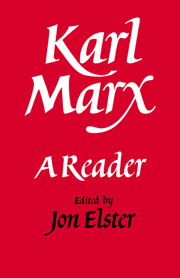VII - Marx's Theory of Politics
Published online by Cambridge University Press: 05 June 2012
Summary
Everything Marx wrote was intended to serve the political goal of the communist revolution – directly or indirectly, proximately or ultimately. The immediately political writings fall into two categories, depending on whether Marx was primarily participant or observer. Selections 24 and 25 show Marx as a participant in German revolutionary politics, whereas in Selections 26 and 27 he writes mainly as an observer of French politics. Selections 28 and 29 offer some general comments on politics in the transition to communism and on communist self-government.
FROM THE COMMUNIST MANIFESTO
The passage excerpted here is the second section of this pamphlet. (The third and final section, not included in this volume, is a survey of earlier socialist and communist writings.)
PROLETARIANS AND COMMUNISTS
In what relation do the Communists stand to the proletarians as a whole?
The Communists do not form a separate party opposed to other working-class parties.
They have no interests separate and apart from those of the proletariat as a whole.
They do not set up any sectarian principles of their own, by which to shape and mould the proletarian movement.
The Communists are distinguished from the other working-class parties by this only: (1) In the national struggles of the proletarians of the different countries, they point out and bring to the front the common interests of the entire proletariat, independently of all nationality. (2) In the various stages of development which the struggle of the working class against the bourgeoisie has to pass through, they always and everywhere represent the interests of the movement as a whole.
- Type
- Chapter
- Information
- Karl MarxA Reader, pp. 257 - 298Publisher: Cambridge University PressPrint publication year: 1986



